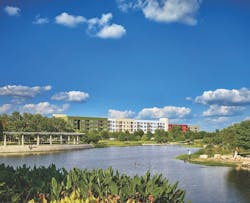One of Burns & McDonnell’s recent projects was the Hawaii Air National Guard Squad operations and training campus at Joint Base Pearl Harbor-Hickam. The LEED Platinum project was designed for zero-net energy use. Burns & McDonnell developed an energy-conservation investment program for the integration of photovoltaic arrays. The building also is resilient enough to withstand hurricane forces.
“Just being green is not enough,” says Stephanie Graham, Burns & McDonnell’s Sustainability Manager. Her firm has seen increasing demand for supplier transparency, where clients qualify and rate service providers based on their third-party certifications.
At a minimum, she says, providers are expected to benchmark their carbon emissions, track goals, and publish results. She adds that a growing number of her firm’s projects now aim for zero-net water use and zero-net waste in construction.
The majority of Page’s design teams now use parametric energy modeling tools to take advantage of opportunities to design passive energy solutions prior to engineers taking over to create active solutions, says Robert Phinney, Page’s Associate Principal and Sustainable Design Director.
ALSO SEE: BD+C Giants 300 green rankings
Top 130 green architecture firms
Top 45 green engineering firms
Top 85 green construction firms
Phinney says achieving zero-net energy in buildings is now a “mainstream” pursuit for many developers and their AEC partners. “New technologies, renewed knowledge of passive systems, and affordable renewables are evaporating the boundaries that have traditionally kept a large part of the industry from pursuing green building,” he says.
Burns & McDonnell is designing buildings to recapture and filter stormwater to replenish aquifers and alleviate burdens on sewer systems. Its construction group offers material reuse services to place excess or “like new” construction products into buildings.
Burns & McDonnell is also incorporating wellness components, such as biophilia and optimized views of the outdoors, into projects. One such case: its renovation of the three-story, 47,500-sf Independence Utilities Center near Kansas City, which opened last November and earned a LEED Platinum rating.
